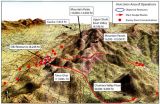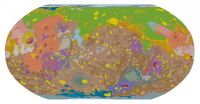(Press-News.org) Men who are already obese as teenagers could grow up to earn up to 18 percent less than their peers of normal weight. So says Petter Lundborg of Lund University, Paul Nystedt of Jönköping University and Dan-olof Rooth of Linneas University and Lund University, all in Sweden. The team compared extensive information from Sweden, the United Kingdom and the United States, and the results are published in Springer's journal Demography.
The researchers analyzed large-scale data of 145,193 Swedish-born brothers who enlisted in the Swedish National Service for mandatory military service between 1984 and 1997. This included information gathered by military enlistment personnel and certified psychologists about the soldiers' cognitive skills (such as memory, attention, logic and reasoning) and their non-cognitive skills (such as motivation, self-confidence, sociability and persistence) which can affect their productivity. Tax records were then used to gauge the annual earnings of this group of men, who were between 28 and 39 years old in 2003. The Swedish results were further compared with data from the British National Child Development Study and the US National Longitudinal Survey of Youth, 1979.
Previous research has shown only that obese young women pay a price when they enter the labor market. This study is the first to show how this pattern also emerges among men who were already overweight or obese as teenagers, but does not hold true for males who gain excessive weight only later in life. In fact, obese teenage boys can grow up to earn 18 percent less in adulthood.
"To put this figure into perspective, the estimated return to an additional year of schooling in Sweden is about six percent. The obesity penalty thus corresponds to almost three years of schooling, which is equivalent to a university bachelor's degree," the authors explain.
A strikingly similar pattern also emerged when the researchers used the specific data sets from the United Kingdom and the United States. This confirms that the wage penalty is unique to men who are already overweight or obese early in their lives.
The researchers ascribe the wage penalty partly to obese adolescents' often possessing lower levels of cognitive and non-cognitive skills. This is consistent with the evidence linking body size during childhood and adolescence with bullying, lower self-esteem and discrimination by peers and teachers.
The researchers advise that policies and programs target overweight and obesity problems, which are often more common among low-income households. This could reduce disparities in child and adolescent development and socio-economic inequalities. It could also cut persistent patterns of low income across generations.
"Our results suggest that the rapid increase in childhood and adolescent obesity could have long-lasting effects on the economic growth and productivity of nations. We believe that the rationale for government intervention for these age groups is strong because children and adolescents are arguably less able to take future consequences of their actions into account," says Nystedt. "These results reinforce the importance of policy combating early-life obesity in order to reduce healthcare expenditures as well as poverty and inequalities later in life."
INFORMATION:
Reference:
Lundborg, P., Nystedt P. and Rooth, D. (2014). Body Size, Skills, and Income: Evidence from 150,000 Teenage Siblings, Demography. DOI 10.1007/s13524-014-0325-6.
Note to young men: Fat doesn't pay
Obese teenage boys could be paid 18 percent less once they enter job market
2014-09-23
ELSE PRESS RELEASES FROM THIS DATE:
Immune system is key ally in cyberwar against cancer
2014-09-23
Research by Rice University scientists who are fighting a cyberwar against cancer finds that the immune system may be a clinician's most powerful ally.
"Recent research has found that cancer is already adept at using cyberwarfare against the immune system, and we studied the interplay between cancer and the immune system to see how we might turn the tables on cancer," said Rice University's Eshel Ben-Jacob, co-author of a new study this week in the Early Edition of the Proceedings of the National Academy of Sciences.
Ben-Jacob and colleagues at Rice's Center for Theoretical ...
UTSA microbiologists discover regulatory thermometer that controls cholera
2014-09-23
Karl Klose, professor of biology and a researcher in UTSA's South Texas Center for Emerging Infectious Diseases, has teamed up with researchers at Ruhr University in Bochum, Germany to understand how humans get infected with cholera, Their findings were released this week in an article published by the Proceedings of the National Academy of Sciences.
Cholera is an acute infection caused by ingestion of food or water that is contaminated with the bacterium Vibrio cholerae. An estimated three to five million cases are reported annually and 100,000-120,000 people die from ...
'Space bubbles' may have aided enemy in fatal Afghan battle
2014-09-23
WASHINGTON, DC—In the early morning hours of March 4, 2002, military officers in Bagram, Afghanistan desperately radioed a Chinook helicopter headed for the snowcapped peak of Takur Ghar. On board were 21 men, deployed to rescue a team of Navy SEALS pinned down on the ridge dividing the Upper and Lower Shahikot valley. The message was urgent: Do not land on the peak. The mountaintop was under enemy control.
The rescue team never got the message. Just after daybreak, the Chinook crash-landed on the peak under heavy enemy fire and three men were killed in the ensuing firefight.
A ...
This week from AGU: New geologic map of Mars, storm surge in Florida
2014-09-23
From this week's Eos: The New Geologic Map of Mars: Guiding Research and Education
Currently, five spacecraft are investigating Mars, and a swarm of new missions to the Red Planet either have been launched or are in development. They are designed to probe the surface, subsurface, and atmosphere with a host of scientific instruments. Where will they make new discoveries? Clues to where they should focus investigations can be gleaned from the planet's new geologic map.
From AGU's journals: History of storm surge in Florida strongly underestimated
The observational ...
Water-quality trading can reduce river pollution
2014-09-23
DURHAM, N.C. -- Allowing polluters to buy, sell or trade water-quality credits could significantly reduce pollution in river basins and estuaries faster and at lower cost than requiring the facilities to meet compliance costs on their own, a new Duke University-led study finds.
The scale and type of the trading programs, though critical, may matter less than just getting them started.
"Our analysis shows that water-quality trading of any kind can significantly lower the costs of achieving Clean Water Act goals," said Martin W. Doyle, professor of river science and policy ...
State policies are effective in reducing power plant emissions, CU-led study finds
2014-09-23
A new study led by the University of Colorado Boulder found that different strategies used by states to reduce power plant emissions -- direct ones such as emission caps and indirect ones like encouraging renewable energy -- are both effective. The study is the first analysis of its kind.
The findings are important because the success of the Environmental Protection Agency's proposed Clean Power Plan depends on the effectiveness of states' policies in reducing power plants' carbon dioxide emissions. The plan would require each state to cut CO2 pollution from power plants ...
Big changes in the Sargasso Sea
2014-09-23
Over one thousand miles wide and three thousand miles long, the Sargasso Sea occupies almost two thirds of the North Atlantic Ocean. Within the sea, circling ocean currents accumulate mats of Sargassum seaweed that shelter a surprising variety of fishes, snails, crabs, and other small animals. A recent paper by MBARI researcher Crissy Huffard and others shows that in 2011 and 2012 this animal community was much less diverse than it was in the early 1970s, when the last detailed studies were completed in this region.
This study was based on field research led by MBARI ...
Study finds gallbladder surgery can wait
2014-09-23
LOS ANGELES – (September 23, 2014) –Laparoscopic cholecystectomy, a minimally invasive procedure to remove the gallbladder, is one of the most common abdominal surgeries in the U.S. Yet medical centers around the country vary in their approaches to the procedure with some moving patients quickly into surgery while others wait.
In a study published online Monday in the American Journal of Surgery, researchers found gallbladder removal surgery can wait until regular working hours rather than rushing the patients into the operating room at night.
"The urgency of removing ...
'Bendy' LEDs
2014-09-23
VIDEO:
This is an animation of the micro-rod growth process.
Click here for more information.
WASHINGTON D.C., Sept. 23, 2014 -- "Bendy" light-emitting diode (LED) displays and solar cells crafted with inorganic compound semiconductor micro-rods are moving one step closer to reality, thanks to graphene and the work of a team of researchers in Korea.
Currently, most flexible electronics and optoelectronics devices are fabricated using organic materials. But inorganic compound ...
Diabetes: Complexity lost
2014-09-23
WASHINGTON, D.C., September 23, 2014 -- For millions of people in the United States living with Type 1 or Type 2 diabetes, measuring the daily rise and fall of blood glucose (sugar) is a way of life.
Our body's energy is primarily governed by glucose in the blood, and blood sugar itself is exquisitely controlled by a complicated set of network interactions involving cells, tissues, organs and hormones that have evolved to keep the glucose on a relatively even keel, pumping it up when it falls too low or knocking it down when it goes too high. This natural dynamical balance ...
LAST 30 PRESS RELEASES:
Scientists show how to predict world’s deadly scorpion hotspots
ASU researchers to lead AAAS panel on water insecurity in the United States
ASU professor Anne Stone to present at AAAS Conference in Phoenix on ancient origins of modern disease
Proposals for exploring viruses and skin as the next experimental quantum frontiers share US$30,000 science award
ASU researchers showcase scalable tech solutions for older adults living alone with cognitive decline at AAAS 2026
Scientists identify smooth regional trends in fruit fly survival strategies
Antipathy toward snakes? Your parents likely talked you into that at an early age
Sylvester Cancer Tip Sheet for Feb. 2026
Online exposure to medical misinformation concentrated among older adults
Telehealth improves access to genetic services for adult survivors of childhood cancers
Outdated mortality benchmarks risk missing early signs of famine and delay recognizing mass starvation
Newly discovered bacterium converts carbon dioxide into chemicals using electricity
Flipping and reversing mini-proteins could improve disease treatment
Scientists reveal major hidden source of atmospheric nitrogen pollution in fragile lake basin
Biochar emerges as a powerful tool for soil carbon neutrality and climate mitigation
Tiny cell messengers show big promise for safer protein and gene delivery
AMS releases statement regarding the decision to rescind EPA’s 2009 Endangerment Finding
Parents’ alcohol and drug use influences their children’s consumption, research shows
Modular assembly of chiral nitrogen-bridged rings achieved by palladium-catalyzed diastereoselective and enantioselective cascade cyclization reactions
Promoting civic engagement
AMS Science Preview: Hurricane slowdown, school snow days
Deforestation in the Amazon raises the surface temperature by 3 °C during the dry season
Model more accurately maps the impact of frost on corn crops
How did humans develop sharp vision? Lab-grown retinas show likely answer
Sour grapes? Taste, experience of sour foods depends on individual consumer
At AAAS, professor Krystal Tsosie argues the future of science must be Indigenous-led
From the lab to the living room: Decoding Parkinson’s patients movements in the real world
Research advances in porous materials, as highlighted in the 2025 Nobel Prize in Chemistry
Sally C. Morton, executive vice president of ASU Knowledge Enterprise, presents a bold and practical framework for moving research from discovery to real-world impact
Biochemical parameters in patients with diabetic nephropathy versus individuals with diabetes alone, non-diabetic nephropathy, and healthy controls
[Press-News.org] Note to young men: Fat doesn't payObese teenage boys could be paid 18 percent less once they enter job market





